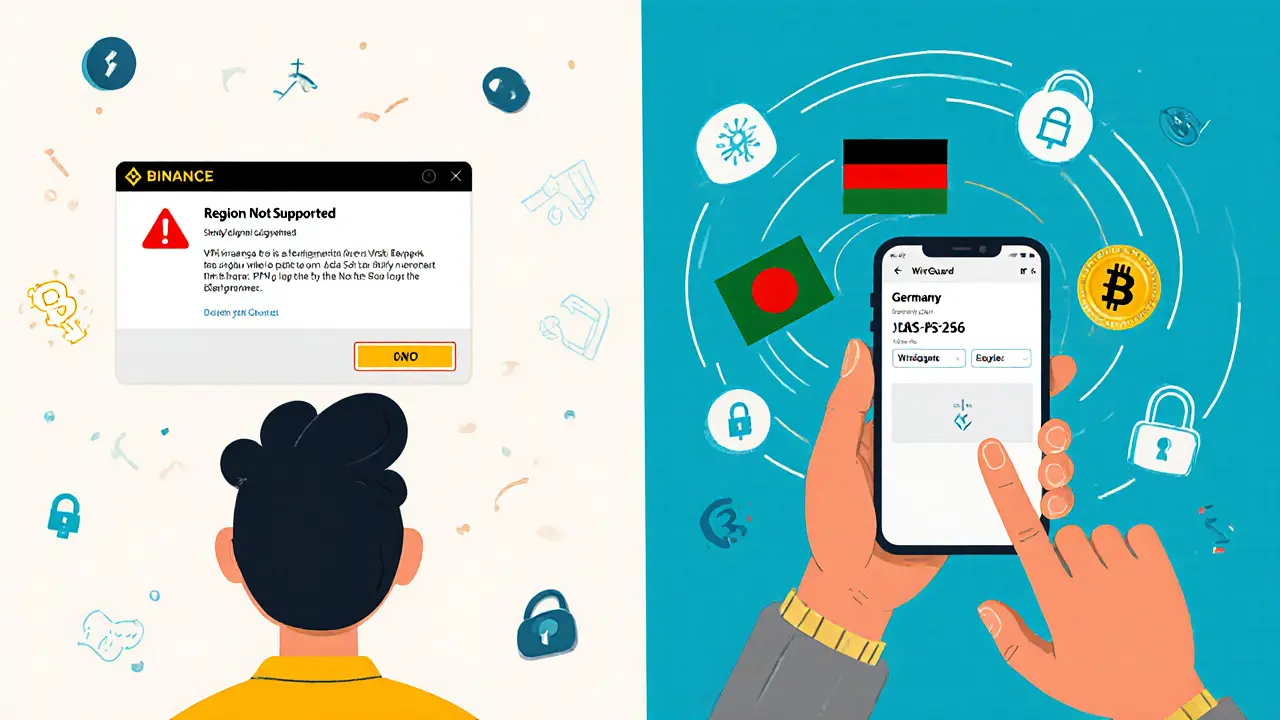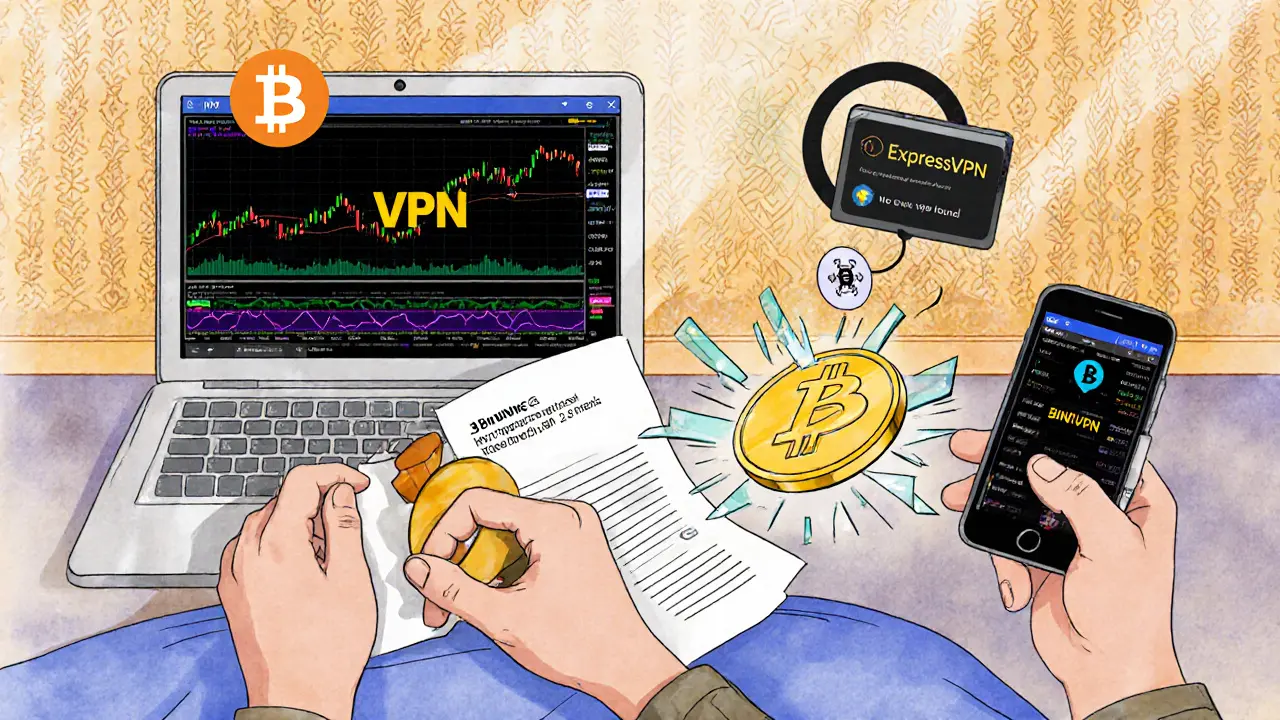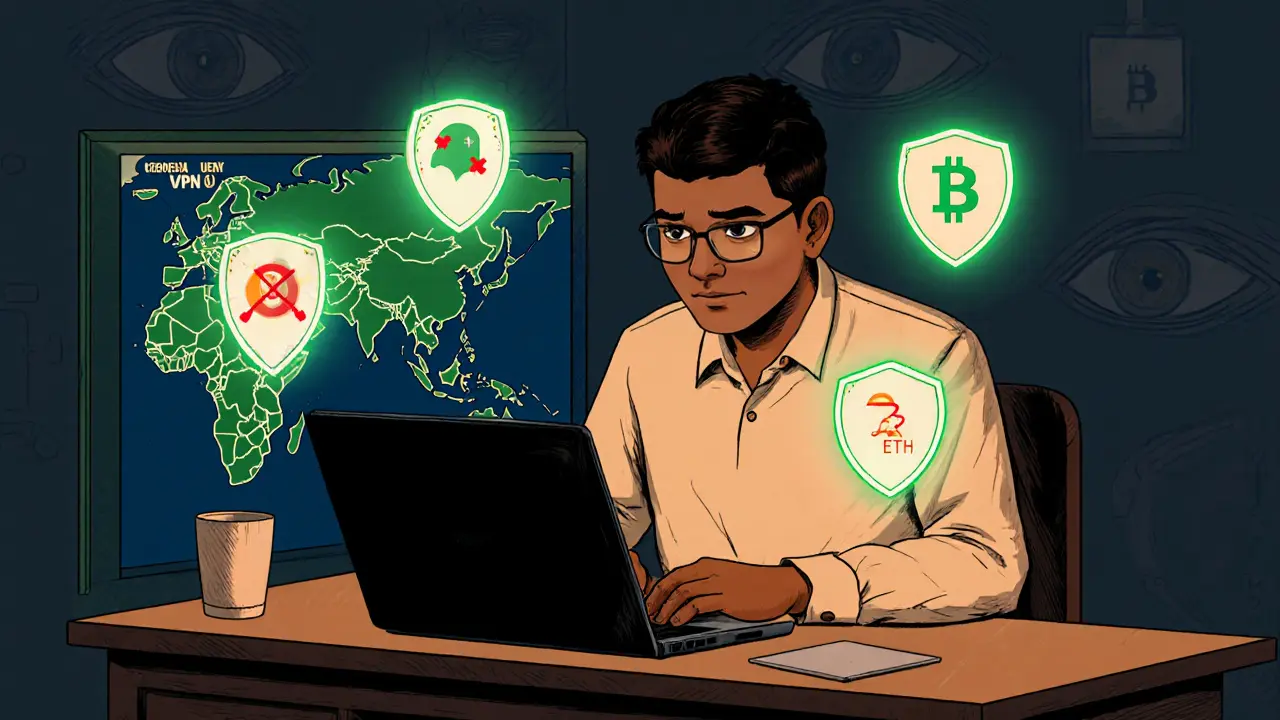Best VPN for Crypto Trading in Bangladesh
Find the best VPN for trading crypto in Bangladesh based on your priorities. Answer the questions below and get recommendations for the most suitable VPN service for your needs.
What's most important for your VPN?
Based on your selections, here are the best options:
Important Notes
Remember: VPNs don't make you completely anonymous. Always use strong passwords, enable 2FA, and never share your seed phrase. Connect to servers in countries like US, UK, Germany, Japan, or Singapore for best results.
For many people in Bangladesh, buying Bitcoin or trading on Binance isn’t as simple as opening an app. The country doesn’t ban cryptocurrency outright, but it doesn’t make it easy either. Banks block transactions linked to crypto. Exchanges like Bitfinex and Binance restrict access from Bangladeshi IP addresses. And with the Digital Security Act in place since 2018, the government can monitor online activity - including what sites you visit and what you search for. That’s why thousands of Bangladeshis are turning to VPNs to trade crypto safely and privately.
Why VPNs Are Essential for Crypto in Bangladesh
If you’re trading crypto from Bangladesh without a VPN, you’re exposing yourself. Every time you connect to a crypto exchange, your real IP address is logged. That means your location, device, and even your internet provider are tied to your trading activity. Since Bitcoin transactions are public, anyone with the right tools can trace your wallet back to your IP. In a country where digital surveillance is real, that’s dangerous. A VPN hides your real IP. Instead, it gives you a new one - from a country where crypto exchanges are fully open. So when you log into Binance, the platform thinks you’re in Germany, Japan, or Singapore. Not Bangladesh. That’s the first layer of protection. But it’s not just about bypassing blocks. A good VPN also encrypts everything you send and receive. Your login details, wallet passwords, and even your seed phrases become unreadable to hackers, ISPs, or government monitors. Without encryption, your crypto data is like leaving your house key under the mat - someone can find it, and they will.Which Crypto Exchanges Block Bangladesh?
Not all exchanges treat Bangladesh the same. Some outright block users. Others just make it hard. - Bitfinex explicitly blocks users from Bangladesh, along with a few other countries like Ecuador and Bolivia. - Binance doesn’t list Bangladesh as a banned country on its official site, but many users report being locked out or seeing error messages like "Your region is not supported." This is likely due to IP-based geo-blocking, not a formal ban. - Kraken and Coinbase also restrict access based on IP location. Even if you have an account, you might get logged out or blocked when trying to trade from a Bangladeshi network. That’s why you can’t just use any internet connection. You need to mask your location - and that’s where a reliable VPN comes in.What Makes a Good VPN for Crypto in Bangladesh?
Not every VPN works here. Many free or low-quality services get blocked quickly. Others leak your real IP or log your activity - which defeats the whole purpose. For crypto traders in Bangladesh, you need four things:- AES-256 encryption - the gold standard. It scrambles your data so no one can read it, even if they intercept it.
- WireGuard or OpenVPN protocols - faster and more secure than older options. WireGuard is especially good for mobile users who need quick, stable connections.
- Large server network - you need servers in countries where exchanges aren’t blocked. The more options you have, the better your chances of finding one that works.
- No-logs policy - the provider must not store your browsing history, connection times, or IP addresses. If they do, they can hand it over to authorities.

Best VPNs for Bangladeshi Crypto Traders
Based on real-world testing and user reports from Bangladesh, these three services stand out:| VPN Service | Best For | Server Countries | Encryption | Payment Options | Money-Back Guarantee |
|---|---|---|---|---|---|
| ExpressVPN A high-speed, reliable VPN with RAM-only servers and strong privacy features | Speed and reliability | 105+ | AES-256, WireGuard | Credit card, PayPal, Bitcoin | 30 days |
| NordVPN Strong security suite with dark web monitoring and crypto payment support | Security and privacy | 118+ | AES-256, NordLynx (WireGuard) | Bitcoin, Ethereum, other cryptos via CoinGate | 30 days |
| Surfshark Affordable option with unlimited devices and clean IP addresses | Budget users and multi-device households | 100+ | AES-256, WireGuard | Credit card, PayPal, Bitcoin | 30 days |
ExpressVPN is the most consistent at bypassing blocks. Its servers are designed to avoid detection by crypto exchanges. NordVPN is the best if you care about security beyond just hiding your IP - it scans the dark web for leaked data and blocks malicious sites automatically. Surfshark is the most affordable and lets you connect unlimited devices, which is great if you trade from your phone, laptop, and tablet.
How to Set Up a VPN for Crypto Trading
It’s not complicated. Here’s how to do it in five steps:- Choose a VPN - Pick one from the list above. Avoid free services like Hotspot Shield or Windscribe - they often log data or have slow speeds.
- Sign up - Use an email you don’t use for anything else. If you want total privacy, pay with Bitcoin.
- Download the app - Get it from the official website, not the Google Play Store or Apple App Store. Some apps get pulled from stores in restricted countries.
- Connect to a server - Pick a country where crypto exchanges are open. Try the US, UK, Germany, or Japan. Avoid servers labeled "obfuscated" unless you’re having trouble connecting - they’re slower.
- Open your exchange - Log in to Binance, Kraken, or whatever you use. If you get blocked, try a different server. Clear your browser cache if it still doesn’t work.
Pro tip: Always disconnect your VPN before logging out of your crypto account. If you reconnect from a different IP while still logged in, some exchanges flag it as suspicious and lock your account.

Security Risks and How to Avoid Them
Even with a VPN, you’re not 100% safe. Here’s what can go wrong - and how to stop it:- Phishing sites - Fake Binance or Coinbase login pages are everywhere. A good VPN like NordVPN blocks these automatically. If yours doesn’t, install a browser extension like Bitdefender TrafficLight.
- IP leaks - Some VPNs accidentally show your real IP. Test yours at ipleak.net (you can use a public library Wi-Fi to do this). If your real location shows up, switch providers.
- Weak passwords - A VPN won’t save you if your exchange password is "12345678". Use a password manager. Enable two-factor authentication (2FA) with an app like Authy, not SMS.
- Seed phrase exposure - Never type your recovery phrase into a browser. Write it on paper. Store it in a safe. If you lose it, you lose your crypto - no VPN can recover it.
Remember: Your VPN protects your connection. It doesn’t protect your behavior. Don’t click random links. Don’t share your wallet address on social media. Don’t use public Wi-Fi without a VPN.
What If the VPN Doesn’t Work?
Sometimes, exchanges update their blocking systems. You connect, but Binance still says "Access Denied." Here’s what to try:- Switch to a different server in the same country.
- Clear your browser cache and cookies.
- Try a different browser - Chrome, Firefox, or Edge.
- Use the VPN’s browser extension instead of the app.
- Contact customer support. Most top VPNs offer 24/7 live chat. Ask them: "Which server works best for Binance in Bangladesh?" They’ve seen this problem before.
If nothing works, wait 24 hours. Some blocks are temporary. Exchanges don’t always know you’re using a VPN - they just see a sudden spike in traffic from a certain IP. After a day, the block may lift.
Final Thoughts
Crypto trading in Bangladesh isn’t illegal, but it’s risky. The government doesn’t need to ban Bitcoin to control it - they just need to make it hard to access. That’s why VPNs aren’t just a tool. They’re a necessity. The right VPN gives you privacy, access, and control. It lets you trade without fear of being watched, tracked, or locked out. It’s not about breaking rules - it’s about protecting your money in a system that doesn’t trust you. Start with one of the three recommended services. Test it for 30 days. If it works, keep it. If not, try another. Your crypto is worth the effort.Is it legal to use a VPN for crypto in Bangladesh?
Yes, using a VPN is legal in Bangladesh. The government hasn’t banned VPNs. But using one to access restricted services like crypto exchanges exists in a gray area. While you won’t be arrested for using a VPN, your online activity can still be monitored under the Digital Security Act. A good VPN keeps your traffic encrypted and your identity hidden, reducing your risk.
Can I use a free VPN for crypto trading?
Not safely. Free VPNs often log your data, sell it to advertisers, or have slow speeds that ruin trading. Some even inject ads or malware. Proton VPN offers a free plan with strong privacy, but it has limited servers and no crypto payments. For trading, it’s not worth the risk. Pay for a trusted service - it’s cheaper than losing your Bitcoin.
Which country’s server should I connect to for Binance?
Try servers in the United States, Germany, Japan, or Singapore first. These countries have no restrictions on Binance and offer fast, stable connections. Avoid servers in countries like Russia or China - they’re often flagged by exchanges. If one server doesn’t work, try another in the same region. Binance’s blocking system is inconsistent, so testing is key.
Can I pay for a VPN with Bitcoin?
Yes. NordVPN, ExpressVPN, and Surfshark all accept Bitcoin and other cryptocurrencies via CoinGate or similar payment processors. Paying with crypto keeps your financial activity private. It also means your bank won’t see the transaction, which helps avoid suspicion from financial institutions that block crypto-related payments.
Do I need a VPN for every device I use to trade crypto?
You should. If you trade from your phone, laptop, and tablet, each device needs its own connection protected. Surfshark and NordVPN allow unlimited devices. ExpressVPN allows up to five. Using a VPN on all devices ensures your entire crypto workflow stays private - whether you’re checking prices on your phone or placing a trade on your laptop.
What happens if my VPN gets blocked by Binance?
If Binance blocks your VPN’s IP, you’ll see an error like "Access Denied" or "Region Not Supported." The solution is simple: switch to a different server. Top VPNs have hundreds of servers - one might work where another doesn’t. If none do, contact support. They often have hidden servers designed to bypass new blocks. This is a common arms race - and the best VPNs win it regularly.
Can I use a VPN to withdraw crypto from Bangladesh?
A VPN helps you access the exchange, but withdrawals depend on your bank. Most Bangladeshi banks block transfers to crypto exchanges, even if you’re using a VPN. You can withdraw crypto to your wallet, but converting it to BDT (Bangladeshi Taka) is harder. Peer-to-peer (P2P) trading on Binance P2P is the most common workaround - you trade directly with other users using local payment methods like bKash or Nagad.
Is Binance P2P safe in Bangladesh?
Yes, if you follow safety rules. Binance P2P lets you buy and sell crypto directly with other users using local payment apps like bKash. Always use Binance’s escrow system - never send money before receiving crypto. Stick to traders with high ratings and many completed trades. Avoid deals that seem too good to be true. P2P is the most practical way to convert crypto to cash in Bangladesh, and millions use it safely every day.

This is legit life-changing info 🚀 I just started trading with ExpressVPN and it’s been smooth as butter. No more "region blocked" nonsense. Crypto freedom is real!
You missed listing Mullvad. It’s open-source, no-logs, accepts cash by mail. Also, why are you recommending ExpressVPN? Their parent company is in the Netherlands - Five Eyes. Do your research.
Let me ask you this - if the government is monitoring everything, how do you know these VPNs aren’t just government fronts? They give you a false sense of security while feeding your data to the same people who wrote the Digital Security Act. This isn’t freedom - it’s a controlled escape hatch. They want you to use VPNs. It keeps the system running.
Y’all need to stop overcomplicating this! Just get Surfshark, pay with BTC, use Authy for 2FA, and boom - you’re golden. I’ve been trading from Dhaka for 2 years. No issues. Just don’t be lazy and use free stuff. Your coins are worth more than your wifi bill 😎
Can you clarify the technical distinction between IP-based geo-blocking and account-level geo-restriction? The post conflates the two. If Binance doesn’t ban Bangladesh outright but blocks IPs, is this a network-level firewall or a user-agent detection mechanism? I’d like to see a reference to their API documentation.
lol i just use a free vpn and it works fine?? why pay? also why is everyone so serious?? its just crypto 😅
This is just enabling illegal behavior. If your country bans crypto transactions, you shouldn’t circumvent it. You’re not a victim - you’re a rulebreaker. Your money isn’t worth risking your freedom over.
I’ve been using NordVPN for 8 months now and it’s been a game-changer. I started with P2P on Binance and now I’m saving in BTC instead of BDT. It’s not perfect, but it’s the best option we have. Thank you for writing this - it’s the kind of practical help we actually need.
Wait… what if the government is using these VPNs to track who’s buying crypto? Like… what if ExpressVPN is secretly working with the NSA and Bangladesh’s cyber unit? I heard they have backdoors in all the big ones. I only use Tor + Whonix now. And I buy the VPN with cash mailed from a friend in Nepal. No digital trail. You’re all being played.